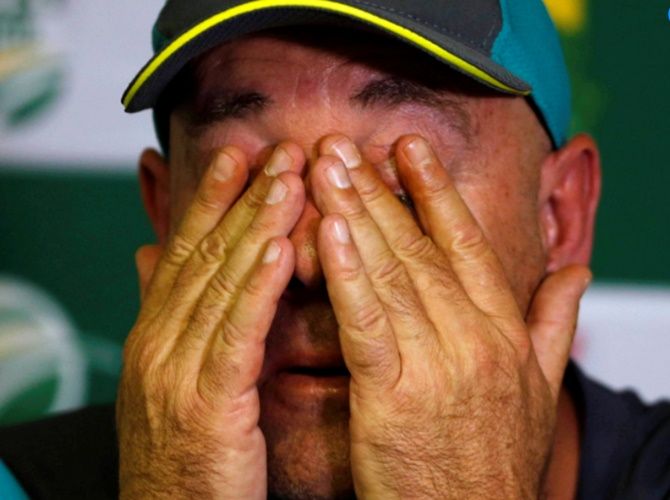Lehmann immediately endeared himself to the team with his relaxed approach that he felt fostered an environment allowing players to express their natural aggression

Darren Lehmann enjoyed success as coach of Australia during five years in charge, but there are many who think his eventual exit more than 12 months before the end of his contract was of his own making.
'Boof', as he is fondly known, said on Thursday he would step down after this week's Test match against South Africa, following a ball-tampering scandal that rocked the sport.
He was cleared of wrongdoing by Cricket Australia, but critics pointed to a culture that had permeated the squad, where the actions of certain players pushed the boundaries of acceptable behaviour, all without sanction from Lehmann.
He was seen as more of a mate than a mentor to the players and ignored murmured protests from the fans and opposition about the way his players conducted themselves on the field.
Former Australia coach Mickey Arthur is among the critics who believe the ball-tampering scandal was an inevitable result of an unwillingness to improve the culture in the country's cricket set-up.
And once the team's culture had come under such intense scrutiny, it always appeared likely that Lehmann would make an exit sooner rather than later, even if he had no direct role in the incident.
In the end he fell on his sword just 24 hours after saying he would not resign, citing his anguish at seeing the pain in guilty players Steve Smith, David Warner and Cameron Bancroft. He added that his family had received abuse in the wake of the scandal.
He also accepted ultimate responsibility for the culture of the team.
Lehmann confirmed in December he would not extend his stint beyond his current contract but this was not the farewell he had imagined after inheriting a beleaguered team from Arthur in 2013 and overseeing World Cup victory in 2015 and two victorious home Ashes campaigns.
As a prolific left-handed batsman, Lehmann played only 27 Tests as his career coincided with a rich vein of talent in Australia's middle order but he was a member of two World Cup-winning squads.
It was in the Indian Premier League where he found his coaching mojo, guiding Deccan Chargers to their maiden title a season after they had finished last.
He also coached Queensland and when the Australia job fell into his lap, Lehmann immediately endeared himself to the team with his relaxed approach that he felt fostered an environment allowing players to express their natural aggression.
In his first get-together with the players, Lehmann declared no team meeting should last more than 30 minutes and headed to the pub.
He also encouraged brave tactics.
"I was quite an aggressive player myself and I've got a captain (Michael Clarke) who is quite aggressive," Lehmann said in 2014.
"...so with Clarke it makes it quite a bit easier to implement an aggressive plan."
At times, Lehmann could be a man of contradictions -- asking Australia fans to send England fast bowler Stuart Broad back from the Ashes series 'crying' before complaining about 'disgraceful' crowd behaviour in the ongoing series in South Africa.
During his eventful tenure, he rebuilt the team more than once and the circumstances around his exit mean he leaves another such rebuilding job behind.












